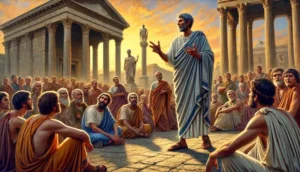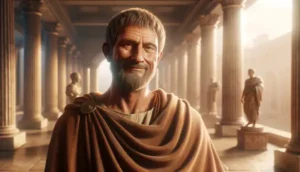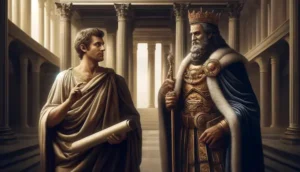In Letter 57, “On the Trials of Travel,” details Seneca’s journey from Baiae to Naples, marked by discomfort and introspection rather than the scenic delight one might expect. The letter serves as a vehicle for Seneca to explore deeper philosophical reflections on fear, the human condition, and the soul’s immortality, sparked by his harrowing experience in a dimly lit, dust-filled tunnel. Through vivid descriptions and thoughtful musings, Seneca transcends the mere inconveniences of travel to delve into the essence of human perceptions and reactions to adversity.
Seneca begins with a lighthearted account of his decision to avoid sea travel due to a supposed storm, only to face a challenging journey by road: “When it was time for me to return to Naples from Baiae, I easily persuaded myself that a storm was raging, that I might avoid another trip by sea; and yet the road was so deep in mud, all the way, that I may be thought none the less to have made a voyage.”
The oppressive environment of the Naples tunnel provokes a contemplation on human fear and the body’s instinctual reactions, regardless of one’s courage or philosophical beliefs: “For there are certain emotions, my dear Lucilius, which no courage can avoid; nature reminds courage how perishable a thing it is.”
"For there are certain emotions, my dear Lucilius, which no courage can avoid; nature reminds courage how perishable a thing it is."
Seneca Tweet This Quote
Seneca further muses on the irrational nature of fear, highlighting how it’s often the cause rather than the consequence of an event that terrifies us: “For what difference does it make whether a watchtower or a mountain crashes down upon us? No difference at all, you will find. Nevertheless, there will be some men who fear the latter mishap to a greater degree, though both accidents are equally deadly; so true it is that fear looks not to the effect, but to the cause of the effect.”
In his reflections on the soul’s response to physical destruction, Seneca delves into the debate on immortality, positing that the soul, due to its subtle nature, cannot be extinguished or harmed by physical means: “Just as fire cannot be crushed out, since it will escape round the edges of the body which overwhelms it; similarly the soul, which consists of the subtlest particles, cannot be arrested or destroyed inside the body.”
Through Letter 57, Seneca transforms a mundane account of travel discomforts into a profound exploration of existential themes. He challenges readers to reconsider their fears and preconceptions about life’s trials, emphasizing the resilience of the human spirit and the intriguing possibility of the soul’s immortality. The letter not only offers insights into Stoic philosophy but also encourages a deeper appreciation for the trials we endure, viewing them as opportunities for reflection and growth.
***** Letters from a Stoic Key Takeaways is a collection of short key takeaways from the letters sent by Seneca to Lucilius. Read each letter’s key takeways here .




